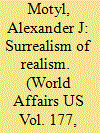| Srl | Item |
| 1 |
ID:
185864


|
|
|
|
|
| Summary/Abstract |
This article contributes to the growing literature on how authoritarian regimes deploy disinformation and conspiracy theories to achieve foreign policy goals. While the effectiveness of these measures is disputed, our study—which is based on a rarely occurring natural experiment—makes an empirical contribution in this direction. Based on the analysis of survey materials collected in Mariupol, Ukraine, around the time of the tumultuous events surrounding the Belarusian presidential election of 2020, we show that, given the right conditions, a critical juncture event in one country can rapidly influence existing patterns of relevant conspiracy belief in a neighbouring one. The right conditions, in this case, include a massive disinformation campaign channelled through (pro-)Russian media, against the backdrop of conspiracy theories already in circulation in Ukraine. The implication of this finding is that the disinformation weapon becomes far more effective when it manages to offer a straightforward explanation (a conspiracy theory) of a critical juncture event that is otherwise complex and multilayered, and that adequate psychological defence mechanisms are needed to mitigate and counter this effect.
|
|
|
|
|
|
|
|
|
|
|
|
|
|
|
|
| 2 |
ID:
141415


|
|
|
|
|
| Summary/Abstract |
Most general readers following events in Ukraine may not be aware that much of the debate and many of the policy prescriptions among “experts” have been dominated by a school of thought in international relations scholarship known as “realism.” In a nutshell, realists have argued that US policy toward the Russo-Ukrainian conflict should be driven by pragmatic American interests and by the realities of Russia’s regional great-power status—two propositions few would disagree with. Realist arguments become more controversial, however, when they go on to insist that Russia’s behavior toward Ukraine is actually a reasonable response to Western attempts to wrest Ukraine from Russia’s sphere of influence and that the culprit behind the ongoing Russo-Ukrainian war is, thus, the West in general and the United States and NATO in particular.
|
|
|
|
|
|
|
|
|
|
|
|
|
|
|
|